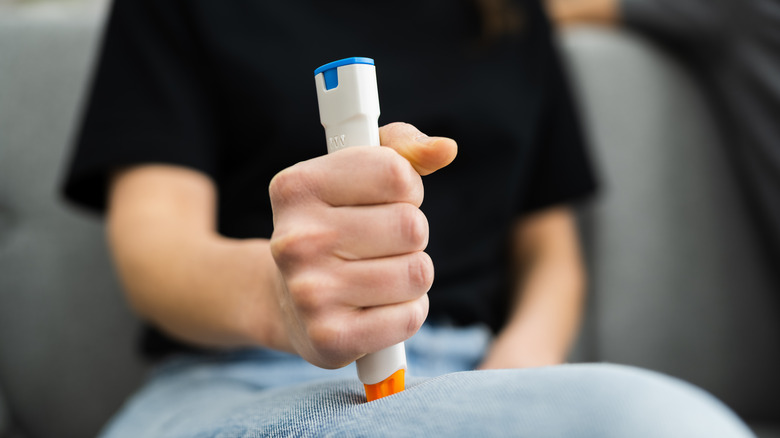How Can You Tell If You're Having An Allergic Reaction?
An allergic reaction occurs when the immune system responds defensively to substances that aren't typically threatening, called allergens (via Healthline). Common allergens include pollen, dust, mold, pet dander, insect bites, and certain foods. When you're exposed to an allergen, your immune system defends itself by producing a chemical called histamine, which triggers an allergic reaction. This can lead to a wide range of symptoms, depending on the severity of the allergic reaction.
If you're experiencing a mild allergic reaction, your symptoms can include hives, rash, itching, watery eyes, allergic rhinitis (sneezing, congestion), and a scratchy throat, according to Healthline. In most cases, mild reactions can be treated at home with over-the-counter antihistamines. However, severe allergic reactions can result in worse symptoms, like wheezing, diarrhea, difficulty breathing, abdominal pain, heart palpitations, trouble swallowing, and swelling of the tongue, eyes, or face. While most of these reactions don't constitute an emergency, a more severe allergic reaction exists which requires immediate medical attention.
Anaphylaxis is an extreme and dangerous allergic reaction
In some cases, people with severe allergies can experience a sudden reaction known as anaphylaxis (via Everyday Health). Anaphylaxis can be life-threatening and is characterized by a swelling of the airway and an inability to breathe. If you've already been diagnosed with an allergy that can lead to anaphylaxis, you should have epinephrine on hand, which can quickly be injected into your outer thigh during an emergency. You will still need to seek immediate medical care even if you self-administer epinephrine.
"The reason you must go to the ER is because you're having a serious allergic reaction, and even if you feel better after taking epinephrine, the symptoms can still come back," Scott H. Sicherer, a professor and department chief at Mount Sinai Hospital, told Everyday Health. "You should go to the ER and stay there for at least four hours to make sure the symptoms are under control," he adds. Your medical team can continue administering medication as needed and ensure a safe recovery.


